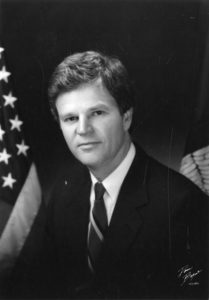Buddy Roemer
Charles "Buddy" Roemer III served as the governor of Louisiana from 1988 to 1992.

Courtesy of State Library of Louisiana
Charles Elson "Buddy" Roemer. Boyne, Don (Photographer)
Charles “Buddy” Elson Roemer III served as the governor of Louisiana from 1988 until 1992, elected as a Democrat but later changing his affiliation to Republican in 1991. He previously served as a member of the US House of Representatives from 1981 to 1988, representing Louisiana’s fourth congressional district. Though he was considered an Ivy League–educated reformer who campaigned by promising “to slay the dragon” of scandal-ridden Governor Edwin Edwards, Roemer compiled a thin record of lasting accomplishments in office during a period of budget cuts caused by depleted tax coffers from the oil bust of the late 1980s.
Roemer was born on October 4, 1943, in Bossier City to Charles Elson Roemer II and Adeline McDade. He graduated from Bossier High School at sixteen and attended Harvard University, where he earned an undergraduate and a master’s degree in business administration. He married his high school sweetheart, Frances Demler, and had two children with her; they later divorced. He also divorced his second wife, Patti Crocker, with whom he had a son. He is survived by his third wife, Scarlett Olson.
Roemer’s family was wealthy and politically connected; when his father invited the 1971 gubernatorial candidates to meet the family, they came in the hopes of winning his support and campaign contributions. The family decided to back Edwards and became closely connected with his governorship. Buddy Roemer led the Edwards campaign in northern Louisiana, and after the election his father was appointed commissioner of administration, where he handled day-to-day matters for the governor. Buddy later used his relationship with Edwards to begin a computer company, offering campaign management.
Roemer continued his involvement with politics; in 1973, he was elected as a delegate to the constitutional convention. He lost a 1978 election for a seat in Congress but later won the seat three times in row, in 1982, 1984, and 1986. A conservative Democrat, he often sided with Republican President Ronald Reagan. Despite his time in Washington, Roemer was still relatively unknown by the 1987 primaries for governor. He entered the race as a long shot, painting himself as a political outsider who would end the era of Edwards’s corruption. In a field of eight Democratic candidates, Roemer led in the primary with 33 percent to Edwin Edwards’s 28 percent. Louisiana’s primary election rules allow the two top vote-getters to make it into the runoff regardless of party affiliation. Edwards withdrew from the runoff election, basically ceding the office to Roemer.
Once in office, Roemer had difficulty maintaining public support. He and his staff lost favor with the other legislators because of their casual appearance and long hair. Roemer did not socialize or throw parties the way previous governors had, and he was notoriously bad at returning phone calls. These factors estranged him from the legislature.
When he attempted to balance the budget—a huge task in the face of debts incurred after the oil boom—Roemer crafted economically advisable solutions that were politically impossible. His plans required cutbacks in spending coupled with tax increases, including a decrease in the Louisiana homestead exemption. They were rejected, first by the legislature and then by popular vote. He finally pursued a plan suggested by Edwards, but which his predecessor had been unable to pass: the legalization of gambling. Although the state constitution required the suppression of gambling, this hurdle was sidestepped by defining the legalized systems as “gaming.” The state lottery, riverboat gambling, and video poker were all legalized.
Among Roemer’s lasting accomplishments was the elimination of shell dredging in Lake Pontchartrain, a move that became the turning point in a long, successful campaign to clean up Louisiana’s largest lake. Industrial dredgers that since 1933 had been allowed to suck up clam shells from the lake bottom had become a hindrance to fisheries and waterfowl and a proximate cause of dead zones in the 630-square-mile body of water. Roemer cited a ruling by the state Department of Environmental Quality that the activity violated state water quality standards and signed an executive order in 1990 banning the practice.
Late in his term, Roemer switched parties and joined the Republicans but never won the full allegiance of long-term members of the state GOP. Despite a scandal-free administration, he failed to increase the support he received in the 1987 election. Gov. Roemer came in third in the 1991 campaign, losing to a controversial pair of politicians who incited strong feelings—Edwin Edwards and former Klansman David Duke.
On the personal side, Roemer was known for his eccentricities. He latched onto the motivational program “Adventures in Attitude” and took his gubernatorial staff on a retreat to explore their inner selves. Whenever they had a negative feeling, they were supposed to think “cancel, cancel” and snap a rubber band worn on the wrist to get rid of the thought. He once delivered a speech inviting legislators to “hold hands, laugh, and share dreams.”
Roemer ran again in 1995 for governor and lost in the primaries. He returned to business, where he successfully founded and managed Business First Bank in Baton Rouge until 2011, when he announced his interest in the 2012 presidential elections. After his exclusion from every nationally televised Republican debate, Roemer pursued a place on a third-party ticket, specifically the Reform Party and Americans Elect nominations. Shortly after Americans Elect declared that they would not be fielding a candidate, Roemer’s campaign announced that because of lack of ballot access, he was ending his presidential campaign.
Charles “Buddy” Roemer died on May 17, 2021, at the age of 77.
